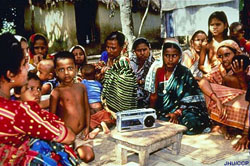|
|
|
"Those who have the mass media in their hands ... bear responsibility for the world and for the future of humanity. Just as the splitting of the atom can immensely enrich humanity in a thousand and one ways and, at the same time, can also threaten it with destruction, so television can have both good and evil consequences. Quickly, suggestively, and to an unprecedented degree, it can disseminate the spirit of understanding, humanity, human solidarity and spirituality, or it can stupefy whole nations and continents. And just as our use of atomic energy depends solely on our sense of responsibility, so the proper use of television depends on our sense of responsibility as well." čVaclav Havel (Sunrise Magazine, 1995) The waves of privatization and pressures toward liberalized trade that have marked the world economic order at the turn of the 21st century have also shaped the world media order. But the media industry is not only affected by these trends, it is also a potential instrument to combat the poverty and inequity of body and consciousness that continue to plague so many of the world's people. Mass media can be the ideological army in support of globalization, but can also undermine those who seek world domination. As coalitions and individual around the world demand that sustainable development become a priority in the world's changing political and economic systems, many civil-society advocates are urging the use of mass media to help communities find local solutions to economic, political and social disempowerment. From town meetings via community television in rural Newfoundland to cultural rituals documented by indigenous people in Brazil to radio programs teaching ecological agriculture in Kenya and anti-pollution in Nepal, MediaChannel affiliates are helping to create communication for change. Much attention on media development these days focuses on bridging what's come to be known as the Digital Divide and on deploying new information and communication technologies, or ICT. Certainly, it is critical that all people, especially the poor, are given the full opportunities of the digital age, but old-fashioned television and radio still have a far greater reach and saturation across the world than computers and the Net. As we continue to push for ways to adopt ICT for democracy and development, we must continue to support public broadcasting, regional stations, community media. |

